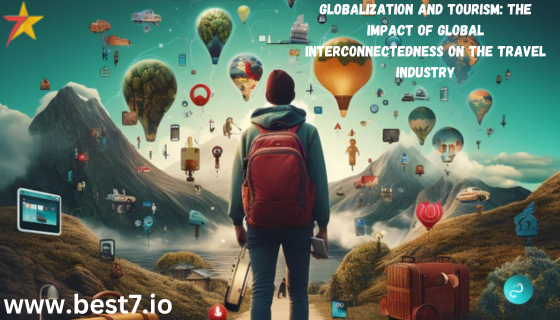
As is known, globalization changes the world, bringing new opportunities and increasing the number of exotic locations and activities for big travel packages and local companies. The tendency is that there are no obstacles to moving and traveling, and any representative of civilization may visit every country or place he/she wants.
All people may see the Great Wall of China, the Rome Coliseum, or go on safari in the Africa savannas. It is significant to pay attention to the fact closely related to globalization, as it changes the tendency to unite people under one roof and makes international trips as accessible as never before.
Therefore, the transfer of goods and information transformed transport companies into travel and logistic providers. Moreover, globalization affected the growth of immigration and travel agencies and played a crucial role in outreaching local communities.
Globalization Changes to the International Tourism Sector
Official statistics prove that globalization has affected director tourism in terms of increasing the number of visitors from one country to another. According to the latest UNWTO’s World Tourism Barometer in 2018, it was reflected that international tourism has reached a new record, increasing by 6%, or 1.4 billion worldwide.
The increase is conditioned by the emergence of cheap flights, changes in visa policies, and growing confidence of the business community in international colleagues in other countries. The case study of Southeast Asia in 2017 is related to the issue.
The revenue of Thai, Indonesian, and Vietnamese authorities has increased due to advanced technologies and low-cast flights from Europe, China, and Australia. To illustrate, in Thailand, the number of visitors increased by 40%, while the Chinese headed the list of travelers, reaching 8.7 million people.
Finally, the agents and global companies are to increase their dialogues and exchange of information and advertisement programs.
Future Projections for International Tourism
Regarding the future, it is projected that international tourism will continue to grow at a rate of 5%, and, by 2030, more than 2 billion international tourists will undertake their journeys. The growth of global tourism will be mainly caused by newly emerged markets, such as China and India, where demand for cross-border travel is expected to grow by 50% over the next decade.
The increasing growth in global travel is sure to further the growth of the tourism industry and will cement the role that globalization played in the formulation of tourism opportunities. The development of tourism as a result of globalization presents numerous profitable opportunities for the travel and tourism industry overall.
The Role of Cultural Exchange in Tourism
First of all, cultural exchange is the most significant advantage that globalization has offered the tourism industry. Nowadays, an overwhelming majority of tourists prefer alternative cultural exchange, effectively making cultural tourism the leading form of travel.
For example, a case study in Italy, conducted in 2016, showed that cultural tourism accounts for around 47% of the total tourism revenue of the country. The research suggested that global tourists spent $45 billion on cultural tourism experiences in Italy, making the demand for alternative experiences significant.
As a direct result of globalization, the experience was made cheaper and more readily available for more people. The implementation of international airports and the general advancement of aviation have made tourism more accessible by providing a variety of languages. Furthermore, globalization has enabled global marketing campaigns, effectively promoting alternative travel experiences.
Emerging Trends in Cultural Tourism
The current need for connection and cultural knowledge drives future growth. A potential paper shows that future projections indicate that cultural tourism will continue to be one of the major influences on the global travel market.
It reveals that the number of cultural tourists is expected to grow by 30% by 2025 and that such destinations as Japan, Mexico, and Egypt are likely to be favorite cultural spotlights. As today’s people want more meaning in their lives and search for connection with different other cultures, the travel and tourism industry are bound to work in the direction of promoting and focusing on cultural tourism.
This will also become one of the solutions on how to determine one destination from another and respond to what consumers today truly want.
The Impact of Globalization on Travel Industry Trends: 7 Points
With the pressure from globalization, the travel industry has gone through dramatic changes and has been generating new trends and shaping travel behavior. Seven points to consider how globalization impacts travel industry trends include the following information:
- The Increased Number of Low-Cost Airlines: As long as globalization forced people to be connected worldwide, the number of international destinations increased. In turn, this situation led to an enlarged number of low-cost airlines, which can be explained by the convenience of air travel. Additionally, the paper shows that the percentage of global air travel is expected to reach 40% by 2025.
- The Number of Visa-Free Countries is Increasing: With the integration into the global world, governments of many countries tend to simplify the visa-requesting process. The Henley Passport Index, as shown in the paper, expects that in 2030, more than 75% of the countries will give travelers a visa-free or a visa-on-arrival option to develop international tourism.
- Digital Nomads and Remote Workers: With the increased number of people connected switched online, there is an increased number of digital nomads, as it is said in the paper, will reach 20% of the global workforce by 2030.
- Personalized Travel Experiences: Personalized travel experiences are in response to globalization and can be attributed to new travel trends and demands. What is more, over 70% of travelers will require more personalized itineraries and travel services. This will make the industry evolve to a more personalized approach and create travel opportunities.
- Expanding the Travel Geography: Globalization shapes the tourism industry by expanding the opportunities beyond the classical places of interest. The tourism industry in Africa, Latin America, and Southeast Asia will grow by 2030 with an expected 50% increase in international tourist arrivals.
- Sustainable Travel: As globalization spreads environmental awareness across the globe, tourism also gets more eco-friendly. Sustainable travel becomes a driving force in the travel industry, and globally more initiatives will be taken to make tourism more sustainable. It is expected that by 2030, eco-tourism will grow by 35%.
- Technological Applications in Tourism: The advance of globalization processes shapes the travel industry by providing opportunities for ICT technologies to flourish. By 2030, artificial intelligence, virtual reality, and biometric systems of identification will be introduced as a daily practice in international travel processes.
Conclusion: The Future of Global Tourism
These trends clearly show that globalization shapes the tourism industry and adds new concepts and travel specifics, taking people to see different places in different ways and making them demand more alternative options.
At the same time, the impact of globalization on tourism also makes us predict the further growth and expansion of the travel market and worldwide travel opportunities.
The article I read was a case study of 2019 tourism growth in Africa. Specifically, the authors discussed a tourism flow to Africa in the last five years, starting from 2013 to 2019. The findings concluded that international tourist arrivals had grown at a rate of 7% per year within the given period of time.
The main reasons for the increased tourism flow were growing disposable incomes and improving infrastructure. In addition, the article presented a prediction that, by 2030, Africa could draw over 100 million international travelers with increased capital injections to the continent of over 260 billion dollars.
However, the given case also leads to a more general conclusion that globalization opened the new horizons for the development of tourism in long-forgotten regions.
Despite those obvious gains, the rise of tourism destinations is much more predictable in the global context. Namely, in the next decades, the world will witness the further increase in global mobility.
To be more specific, in 2035, about 2.5 billion people will be traveling from one country to another. Moreover, tourism will be developing in both places that are traditionally known as tourist destinations and fast-growing markets.
In general, it is safe to assume that global tourism will remain an interrelated and dynamic system of destinations. At the same time, the tourism industry will continue to evolve, and tourism professionals will strive to provide innovative, sustainable, and comprehensive options to global travelers.












